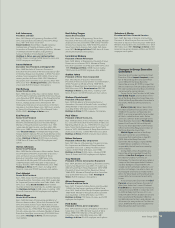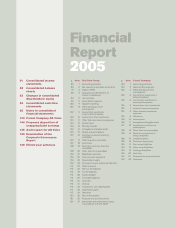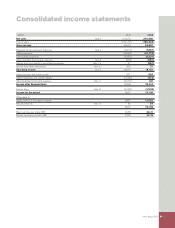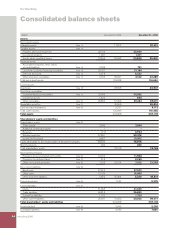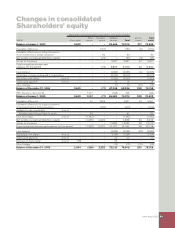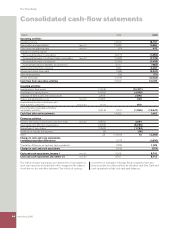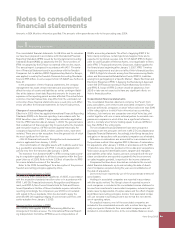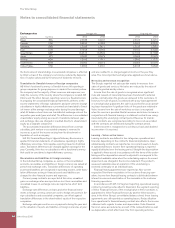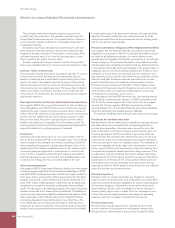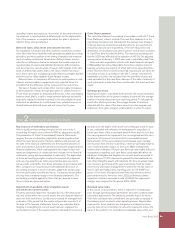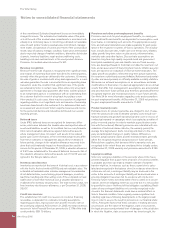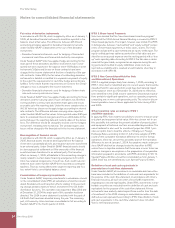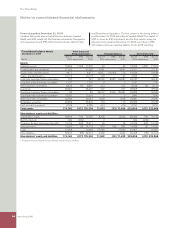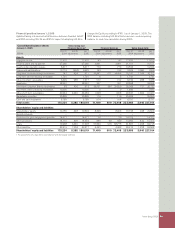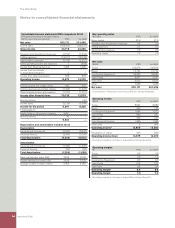Volvo 2005 Annual Report Download - page 90
Download and view the complete annual report
Please find page 90 of the 2005 Volvo annual report below. You can navigate through the pages in the report by either clicking on the pages listed below, or by using the keyword search tool below to find specific information within the annual report.
The Volvo Group
Notes to consolidated fi nancial statements
Exchange rates Average rate Year-end rate
Country Currency 2004 2005 2004 2005
Brasil BRL 2.5388 3.0947 2.5125 3.4215
Canada CAD 5.6495 6.1864 5.4635 6.8435
Denmark DKK 1.2285 1.2471 1.2126 1.2651
Euro EUR 9.1408 9.2943 9.0163 9.4393
Great Britain GBP 13.4515 13.5849 12.7163 13.7388
Japan JPY 0.0680 0.0679 0.0638 0.0679
Norway NOK 1.0926 1.1611 1.0890 1.1770
South Korea KRW 0.0065 0.0073 0.0064 0.0079
United States USD 7.3655 7.4791 6.6138 7.9538
the book value of shareholdings in associated companies is affected
by Volvo’s share of the company’s net income, reduced by deprecia-
tion of surplus values and by the amount of dividends received.
Translation to Swedish kronor of foreign companies
AB Volvo’s functionell currency is Swedish kronor. All reporting in
group companies for group purposes is made in the currency where
the company has the majority of their revenues and expenses; nor-
mally the currency of the country where the company is located. AB
Volvo’s and The Volvo Group’s reporting currency is Swedish kronor.
In preparing the consolidated fi nancial statements, all items in the
income statements of foreign subsidiaries and joint ventures (except
subsidiaries in highly infl ationary economies) are translated to Swed-
ish kronor at the average exchange rates during the year (average
rate). All balance sheet items are translated at exchange rates at the
respective year-ends (year-end rate). The differences in consolidated
shareholders’ equity arising as a result of variations between year-
end exchange rates are charged or credited directly to shareholders’
equity as a separate component.
The accumulated translation differance derived from a certain
subsidiary, joint venture or associated company is reversed to
income as a part of the income arising from the divestment or
liquidation of such a company.
IAS 29, Financial Reporting in Hyperinfl ationary Economies, is
applied to fi nancial statements of subsidiaries operating in highly
infl ationary economies. Volvo applies reporting based on historical
value. Translation differences are charged against earnings for the
year. Currently, Volvo has no subsidiaries with a functional currency
that could be considered a hyperinfl ationary currency.
Receivables and liabilities in foreign currency
In the individual Group companies as well as in the consolidated
accounts, receivables and liabilities in foreign currency are valued at
period-end exchange rates. Translation differences on operating
assets and liabilities are recognized in operating income, while trans-
lation differences arising in fi nancial assets and liabilities are
charged to other fi nancial income and expenses.
Currency swap contracts are reported at fair value, unrealized
gains on exchange rates are reported as short term receivables and
unrealized losses on exchange rates are reported as short term
liabilities.
Exchange rate differences on loans and other fi nancial instru-
ments in foreign currency, which are used to hedge net assets in for-
eign subsidiaries and associated companies, are offset against
translation differences in the shareholders’ equity of the respective
companies.
Exchange rate gains and losses on payments during the year and
on the valuation of assets and liabilities in foreign currencies at year-
end are credited to, or charged against, income in the year they
arise. The more important exchange rates applied are shown above.
Net sales and revenue recognition
The Group’s reported net sales pertain mainly to revenues from
sales of goods and services. Net sales are reduced by the value of
discounts granted and by returns.
Income from the sale of goods is recognized when signifi cant
risks and rewards of ownership have been transferred to external
parties, normally when the goods are delivered to the customers. If,
however, the sale of goods is combined with a buy-back agreement
or a residual value guarantee, the sale is accounted for as an operat-
ing lease transaction if signifi cant risks of the goods are retained in
Volvo. Income from the sale of workshop services is recognized
when the service is provided. Rental revenues and interest income in
conjunction with fi nancial leasing or installment contracts are recog-
nized during the underlying contract period. Revenue for mainte-
nance contracts are recognized according to how costs associated
with the contracts are distributed during the contract period.
Interest income is recognized on a continuous basis and dividend
income when it is received.
Leasing – Volvo as the lessor
Leasing contracts are defi ned in two categories, operational and
fi nancial, depending on the contract’s fi nancial implications. Oper-
ational leasing contracts are reported as non-current assets in Assets
in operational leases. Income from operational leasing is reported
equally distributed over the leasing period. Straight-line depreciation
is applied to these assets in accordance with the terms of the under-
taking and the deprecation amount is adjusted to correspond to the
calculated realizable value when the undertaking expires. Assessed
impairments are charged in the income statement. The product’s
assessed realizable value at expiration of the undertaking is
reviewed continually on an individual basis.
Financial leasing agreements are reported as Non-current
respective Short-term receivables in the customer fi nancing oper-
ations. Income from fi nancial leasing contracts is distributed between
interest income and amortization of the receivable in the customer
fi nancing operations.
In accordance with IAS 14, Segment reporting, operational leasing
contracts should be reclassifi ed to fi nancial in the segment reporting
of Volvo Financial Services if the residual value in these contracts is
guaranteed to Volvo Financial Services by another Volvo business
area. In the Volvo Group’s consolidated balance sheet, these leasing
agreements are still reported as operating leases. Reclassifi cation
from operational to fi nancial leasing contract also affects the income
statement with regards to sales and depreciation. Volvo Financial
Service’s sales are reduced as a result of the reclassifi cation as well
as depreciation, which affect cash fl ow from operating activities.
86 Volvo Group 2005



